
Oxford, Miss (TLV) – Oxford’s Board of Aldermen is considering revisions to the city’s taxi laws; the second of three readings of the law change and a public hearing on the matter were held during the June 17 board meeting.
A few minutes after the meeting started, the room had filled up. When Mayor Pat Patterson asked how many were present to speak about this issue, over a dozen people raised their hands.
“Well,” he said, “we’re going to take our time and try to let you have your say. Now, let’s don’t be repetitive, okay?”
His wish wasn’t honored—it got repetitive pretty quickly because people already had in their minds what they wanted to say.
 The proposed amendment to the laws regarding taxis would, if passed as originally written, revamp the fee structure for fares.
The proposed amendment to the laws regarding taxis would, if passed as originally written, revamp the fee structure for fares.
Currently, drivers are allowed to charge a maximum amount of $10 per person. The proposed change would have the “first” passenger paying $10, each additional passenger paying $5, and passengers at secondary locations or asking the driver to make a “stop” would pay an additional $2.50 each.
The changes would also do the following: require cameras to be installed in all cabs with signage letting customers know they’re being filmed; require every passenger to be given a detailed receipt; forbid any passenger to ride in the taxi’s front seat; replace ambiguous cleanliness and upkeep language with much stricter requirements; prohibit cigarette smoking by any person inside a taxi; disallow cell phone use by drivers when passengers are in the cab except for exclusively hands-free use; and, finally, subject taxis to random inspection by Oxford Police Department to determine compliance with the new laws.
Alderman Jay Hughes, who was absent at the meeting but participated via Skype, said the law changes are to protect the taxi driver—unforeseen things happen in taxis and if everyone is held accountable through written logs and video record, there’s no question later about what actually occurred.
But the law is obviously to protect the customers as well; there’s been talk of price-gouging on Ole Miss game weekends and other special events. Any time a law is written to cover that many folks, give-and-take is required on all ends: legislators, business owners, employees, and customers.
That’s exactly why the Aldermen hold public hearings on issues like this. 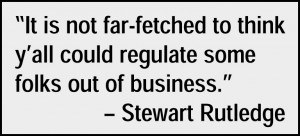
At the June 17 board meeting and public hearing, Jimmy Allgood, Director of Emergency Management, spoke first and clarified that companies would not be required to get meters; the wording in the proposed amendment had been changed at the June 3 meeting; it also changed to read that a passenger may ride in the front seat if all other seats are filled, though they must relocate as soon as any other seat becomes available.
City Attorney Pope Mallette pointed out that he’d like to delete a line forbidding “unauthorized signs or markings, such as bumper stickers,” because it could possibly get into the realm of advertising.
These mark-ups may be just the beginning for this amendment to the taxi laws. Owners and representatives for many taxi companies spoke at the meeting, as well as one concerned citizen.
The idea of requiring a detailed receipt to be handed to every customer concerned many who spoke up. Peggy Mandujano, who was first to speak at the meeting, on behalf of Rebel Taxi (owned by Audie Branch), initially addressed the issue of mandatory receipts by saying, “I have no problem giving anyone a receipt who wants a receipt. I do think it unfair to force drivers to give one to every customer in the taxi who may not want one. Half the time they can’t remember their credit cards, their phones, their shoes…” 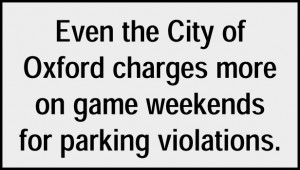
Though one of the ideas behind everyone getting a receipt is to avoid price gouging, Jimmy Thompson, owner of A-1 Taxi, said, “No matter what the rates are, you’re still gonna have price gougers. I’ve seen taxis on game-day come from Memphis, Union County, Lee County, not even authorized to run a taxi in Oxford.”
These “gypsy cabs” are hurting Oxford taxi drivers financially, and online “ridesharing” services like the D.C.-based Uber and Lyft (started in San Francisco but growing rapidly), have yet to be addressed.
Far from price gouging, many Oxford taxi drivers and company owners (including Austin Blake of Austin Taxi, and Phillip Howard, one of his drivers) pointed out that their normal per-person fares are actually less than the current ordinance’s maximum fee of $10.
Alderman-at-Large John Morgan put it best when he said, “I think we’re talking about a maximum rate here, and if these people know what the rate is before they get in there, it’s capitalism and personal responsibility. If they know what the rate is, then they don’t have to ride.”
Mayor Patterson said about receipts, when giving his closing thoughts on this ordinance change, “I’m not sure we’ve got that right; maybe we’ll change that up a little bit.”
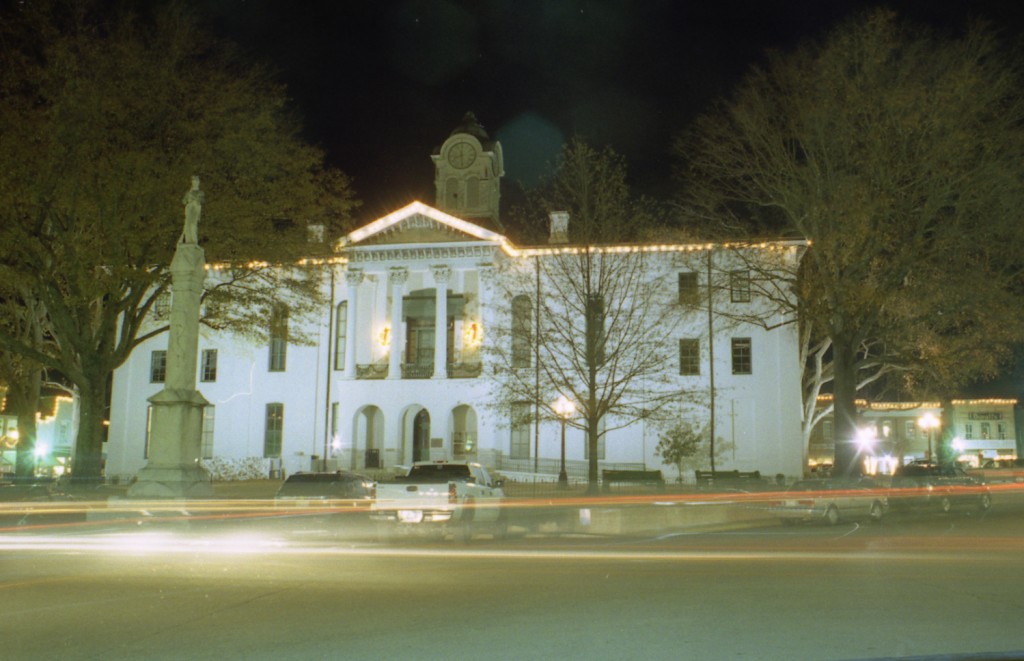 Most of the concerns centered around the new fee structure not allowing drivers to charge $10 per head on Ole Miss game weekends.
Most of the concerns centered around the new fee structure not allowing drivers to charge $10 per head on Ole Miss game weekends.
Mandujano brought up event pricing by saying, “People who come to Oxford on game days know they’re going to spend money.”
She pointed out that many of the city’s businesses raise their rates on game weekends: she stated that not only do area hotels dramatically raise their rates, but bars raise their cover charges, gas stations around the Square raise their per-gallon rate, parking lots that are usually free charge “anywhere from $20–$100,” and “people rent out their homes sometimes for up to $2000 for a weekend.”
She said, “I don’t think the board has taken into account the amount of time it takes to get from A to B in game-day traffic, where a 5-minute ride turns into a 45-minute ride.”
Others who spoke about game-day pricing were Austin Blake of Austin Taxi, Cedric Pegues owner of V.I.P. Taxi, and Kenny Scanlon, a driver for Rock Star Taxi.
Stewart Rutledge spoke on behalf of Rock Star Taxi, as a business advisor to that company’s owner Arseniy Parshikov. He had many of the same concerns as Mandujano, who had mentioned that on game weekends drivers make “good money, but not great money.”
Rutledge said, “I want to encourage you to think of this: there isn’t a whole lot of money to go around here, so every little cut is a big deal. And I think that’s why, when you see further rate restrictions, that’s why the room is full, because it is not far-fetched to think y’all could regulate some folks out of business, and I don’t think y’all want to do that, so I’m trying to provide that perspective.”
Rutledge brought up a June 13 Clarion-Ledger article about alleged game-day price gouging in which Alderman Jay Hughes was reported as saying, “They [the taxi companies] are charging more on those weekends when they aren’t accruing any additional charges and driving the same two miles.”
Rutledge said he hoped the quote was taken out of context, and reiterated that game-day traffic is slow, and added that it decreases the volume and number of rides drivers can take, and certainly causes the companies to accrue additional charges.
Later Rutledge added, “I hope that Oxford’s government will be slow to set rates and prices for private businesses, and as the previous lady [Mandujano] stated, we don’t do that for condos or hotels.”
I’d personally like to note that even the City of Oxford charges more on game weekends for parking violations: at the June 17 meeting, another agenda item was the board’s third reading and vote of an amendment setting up paid parking in which they set up the following fee structure: Maximum fine of $10 (1st and 2nd violations), $25 (3rd), and $50 (4th or more) on days Ole Miss doesn’t play football; maximum fine of $50 (1st violation), $75 (2nd), and $100 (3rd or more) on game days. 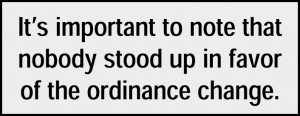
City Attorney Pope Mallette spoke up at that point, stating, “Unlike most everything else where all the city has is a privilege license and we’re able to do some minor control, like with alcohol, building permits…we are charged with putting the regulatory framework for taxis where we’re not with hotels, gas stations, most of these things that have been put out there that charge more on game weekends. That issue has come up with the Attorney General before, they’ve gone after gouging on gasoline and other things, but we are charged as a city with taxi rules and regulations in a way we aren’t with most other things.”
Many who spoke didn’t understand why a clause disallowed passengers to sit in the front seat at any time.
Jimmy Thompson of A-1 Taxi pointed out that he thought it would be safer for a single passenger to ride in the front seat so the driver could keep an eye out, rather than in the back where it’s harder to see.
Surprisingly to me, nobody really conveyed any problems with the new camera requirements at the meeting, except for Sue Lacrosse of Angel Taxi and Stewart Rutledge on behalf of Rock Star Taxi, who both asked that their current camera systems be “grandfathered-in” under the new law.
Near the end of the discussion, Jay Hughes said he would be okay with the use of existing cameras as long as they satisfy the minimum requirements set forth by the law.
Lacrosse and I sat down for a while before the meeting with her new manager Dennis Cochran and we talked for a long time about cameras and other issues. She’s had cameras in most of her cabs for two years now and has been updating the models as she replaces older taxis.
Parshikov also has cameras in his cabs; Rutledge pointed out that Rock Star Taxi has had a driver physically assaulted and one sexually assaulted, and the only way those situations were resolved was through the recordings made by the cameras.
One big problem with the section regarding cameras is that it disallows audio recording; Rutledge said of the two assault cases that the audio was instrumental in bringing justice for the drivers.
The mayor commented that we have thirteen cab companies in Oxford, compared to Memphis’ five.
Jay Hughes wrote in a June 18 email to his constituents, “Following the explosion of taxis in Oxford and the number of complaints we receive, it was necessary to work on changes to address the problems.” It’s important to note that nobody stood up completely in favor of the ordinance change; every driver or owner who got behind the podium had one or more problems with the amendments.
Many taxi owners invited the aldermen to ride along in a taxi as “regular Joes” to see what really goes on. Stewart Rutledge said in his email to the board, “I do encourage you to ride along with some cabs on a busy night. It’ll give you an opportunity to see that most of these guys are doing their best and have little to no room to be cut more.”
Arseniy Parshikov spoke up respectfully about enforcing the laws we already have, and how that might alleviate some of the issues being brought up.
He, like many other drivers and owners of taxi companies, has another business venture and says “If the city continues to regulate the rates lower and lower over the years, I’m going to have to get out of the taxi game because it’s simply not worth my time.” 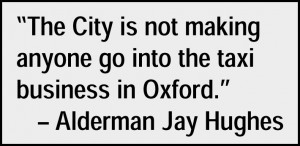
Jay Hughes’ summary of the public hearing is as follows, from his June 18 email to constituents: “The drivers and owners objecteced [sic] to any limits on what they could charge, or having to give out receipts. However, I disclose that I drafted these changes after working on them for several months, and with the city attorneys. I believe the changes will greatly advance the interests of the city in protecting the drivers and passengers, as well as visitors we work so hard to get here in town. Remember, the City is not making anyone go into the taxi business in Oxford, or accept every single fare that taps on their window. But, they are using our city streets we all pay for to make money. Once they do get a license and put people in that vehicle, we have a set of rules they must play by to keep it a safe, level and fair playing field for all. The Third reading and vote should be at the next meeting. If it passes, it will be in effect 30 days from passage.”
Pat Patterson ended the discussion on taxi laws by thanking everyone for coming and for their comments. He said, “We have a code enforcement officer now, and one of his assignments is to enforce code of taxi regulations to try and stop some of this gypsy stuff.” He continued to say, “We’re going to consider it. We might not vote in two weeks—we might take a month to do this. We’re not required to vote in two weeks, so we’ll see.” ![]()
For information on how to get in touch with your Aldermen, visit the City of Oxford’s website here.
